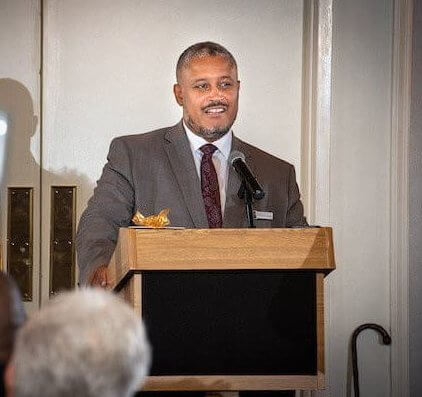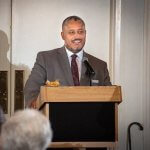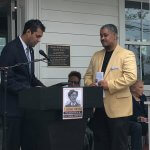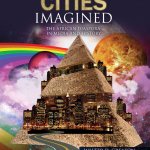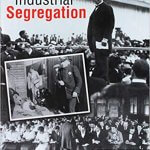On Thursday, Oct. 3, the T. Thomas Fortune Foundation and Cultural Center honored Walter Greason, Ph.D., associate professor and chair of the Department of Educational Counseling and Leadership, with the 2019 Good Fortune Award as he ends his tenure as the founding president of the organization. Since 2009, Greason has served as the academic leader of the effort to save the home of T. Thomas Fortune, a national historic landmark in Red Bank, New Jersey.
The award was given to Greason in recognition of his “academic achievements in the field of African American history, raising global consciousness, challenging perceptions and informing a more accurate representation of our past, present and potential future.”
His research in the books “The Path to Freedom” and “Suburban Erasure” attracted international attention to the effort, culminating in coverage by The New York Times and the philanthropic sponsorship of the historic home’s rehabilitation project led by local developer Roger Mumford.
With over 100 people in attendance, Gilda Rogers ’06M, vice president of the T. Thomas Fortune Foundation and Cultural Center, celebrated a decade of excellence in community service. Attendees included: John Henning, Ph.D., dean of the School of Education; Kurt Wagner, university librarian; Laura Jannone, Ed.D., professor of nursing; Stephanie Bobbitt, Ph.D., and Vernon Smith, Ph.D., professors of educational counseling; David Ford, Ph.D., professor of professional counseling; and Anwar Uhuru, Ph.D., professor of English.
The T. Thomas Fortune Foundation and Cultural Center is currently partnering with the university through the Guggenheim Memorial Library on an exhibit, “Afrofuturist Design: From Ancient Dogon Through Wakandan Futures.”
The exhibit explores forgotten aspects of urban design across the African diaspora based on Greason’s recent books, “Industrial Segregation” and “Cities Imagined,” which contributed to The New York Times’ 1619 Project in August, the Association for the Study of African American Life and History conference in September, and the Society for American City and Regional Planning History conference and Monmouth University’s conference on race, memory, and identity (both in November).

